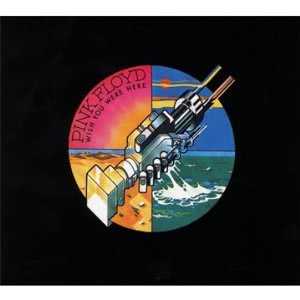Pink Floyd had released the first and most celebrated of their ground breaking ‘concept albums,’ the Alan Parsons produced Dark Side Of The Moon in 1973 to both critical acclaim and general bemusement. The whole idea of constructing an album to flow from ebbs to troughs to soaring guitar solos to haunting harmonies was at that stage foreign to the ears of the popular music scene where the three minute pop song ruled the roost.
Pink Floyd obliterated all understanding of not only what was a pop album but any album. While something so intense and driven could to some be nothing short of unpleasant, this set the bar high for all that followed. However, the evolution of The Pink Floyd would take a further step with the release of Wish You Were Here in 1975.
Gone were the obscure scratchings and monosyllabic beeps that littered the predecessor. Bookended by the haunting “Shine On You Crazy Diamond (Parts 1-V & VI-IX)” and harbouring within three tracks worthy of their own individual limelight. Gathered from the momentum of the previous LP coupled with the band’s own internal growth, it’s a warm sounding horn, drenched in Wright’s keys that make way to the dark, shivering notes of David Gilmour’s guitar. The broken mood is as poignant as it is brilliant.
It is the stuff of legend that during the very recording of the album that the band were paid a visit from an old friend and bandmate – Syd Barrett. Barrett had been out of the band for nearly 6 years and despite some intermittent solo efforts, appeared completely unrecognisable from the man who’d once lead this band. Now, he appeared unannounced while is friends recorded their ode to him. Barrett, the crazy diamond who faded from view and whose eyes were indeed as the lyrics tells “like black holes in the sky.”
For all the overblown genius of Dark Side… it would be the tenderness of Wish You Were Here that would set it apart.
As “Shine On…” fades to black, “Welcome To The Machine” warbles through a familiar drowned-out vocal before Wright’s keys again take hold of the mood. “Have A Cigar” and its wobbling intro add a cheery edge to the overall down trodden album lyrics with the ironic coaxing of the opening ‘Come in now dear boy, have a cigar, you’re gonna go far…’ before its upbeat jam make way for a mid-album gear change.
The awkward manoeuvring of a radio dial offers the distant acoustic tones of the title track. With much of the band’s writing by now dictated almost exclusively by Waters, it would be the oft chance hearing Gilmour innocently strumming away alone that would morph into a heartfelt timeless ballad. Removed are the winding instrumental breaks for which the band would be so revered, leaving exposed a aspect of the band’s song writing abilities which was never quite allowed the exposure it deserved.
Sounding out through a twelve minute reprise of the opening sequences, Gilmour’s skills are once again brought to centre stage through the soaring slide of “Shine On…(Parts VI-IX). The tribute to their former band-mate signs off as it begun with the horns now soothingly triumphant. After delivering such a masterpiece, nothing could be more fitting.
Remastered or not, any Pink Floyd album from Meddle through to The Wall drives listeners to lay on the floor gripping headphones tight to their ears in a haze (of sound). So, while the advent of minor and intricate sharpness is evident, it isn’t anyway markedly different. However, the release of previously unreleased live recordings are fit for release in their own right. Pink Floyd bootlegs litter collector’s piles the world over and it’s in fact the scarcely mentioned “Raving and Drooling” which warrants great applause.
The swaggering, reverb lashed Waters’ bass line nods to Gilmour in a defiant vocal call. Surely, only a tale to tell between the tracks eventually cut down to the final release kept it away. Odd, given it offers substantially more in the way of drama than “Welcome To The Machine”. “You’ve Got To Be Crazy” however doesn’t impress as much, though it too makes effort to conjure further depths with Rick Wright’s keys a feature. The solemn interlude of “Wine Glasses” passes without cause for alarm, as does the alternate vocal approach on the studio recorded version of “Have A Cigar”. Interestingly the layered violin of guest Stéphane Grappelli captured over the alternate “Wish You Were Here” holds great merit, but… is just not Pink Floyd. Sometimes, these things are best left as they are.
Remastered album proper: 9/10
Unreleased Tracks: 6/10
– Ciarán Wilcox



































